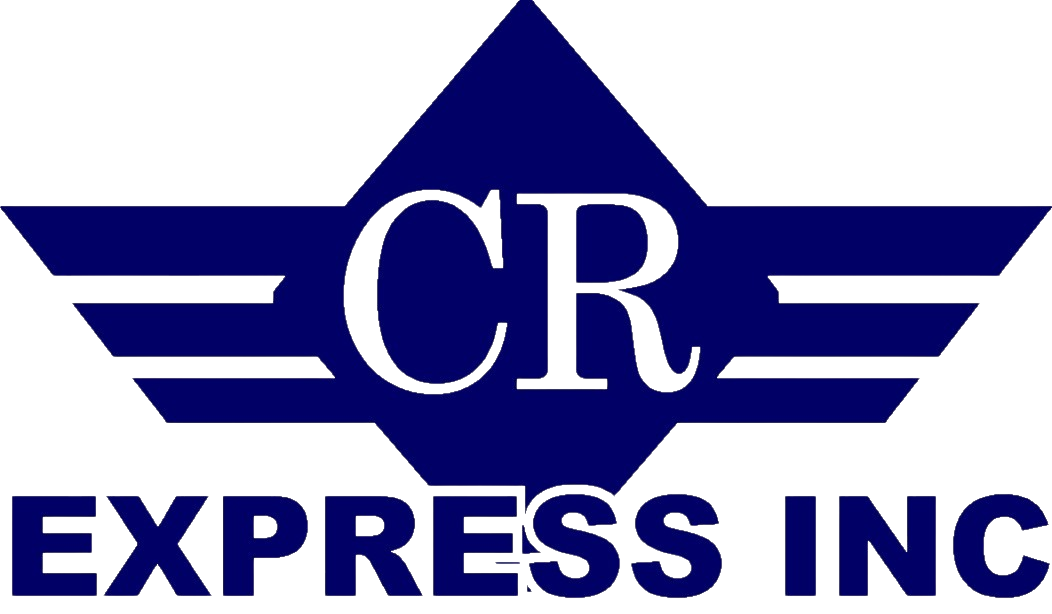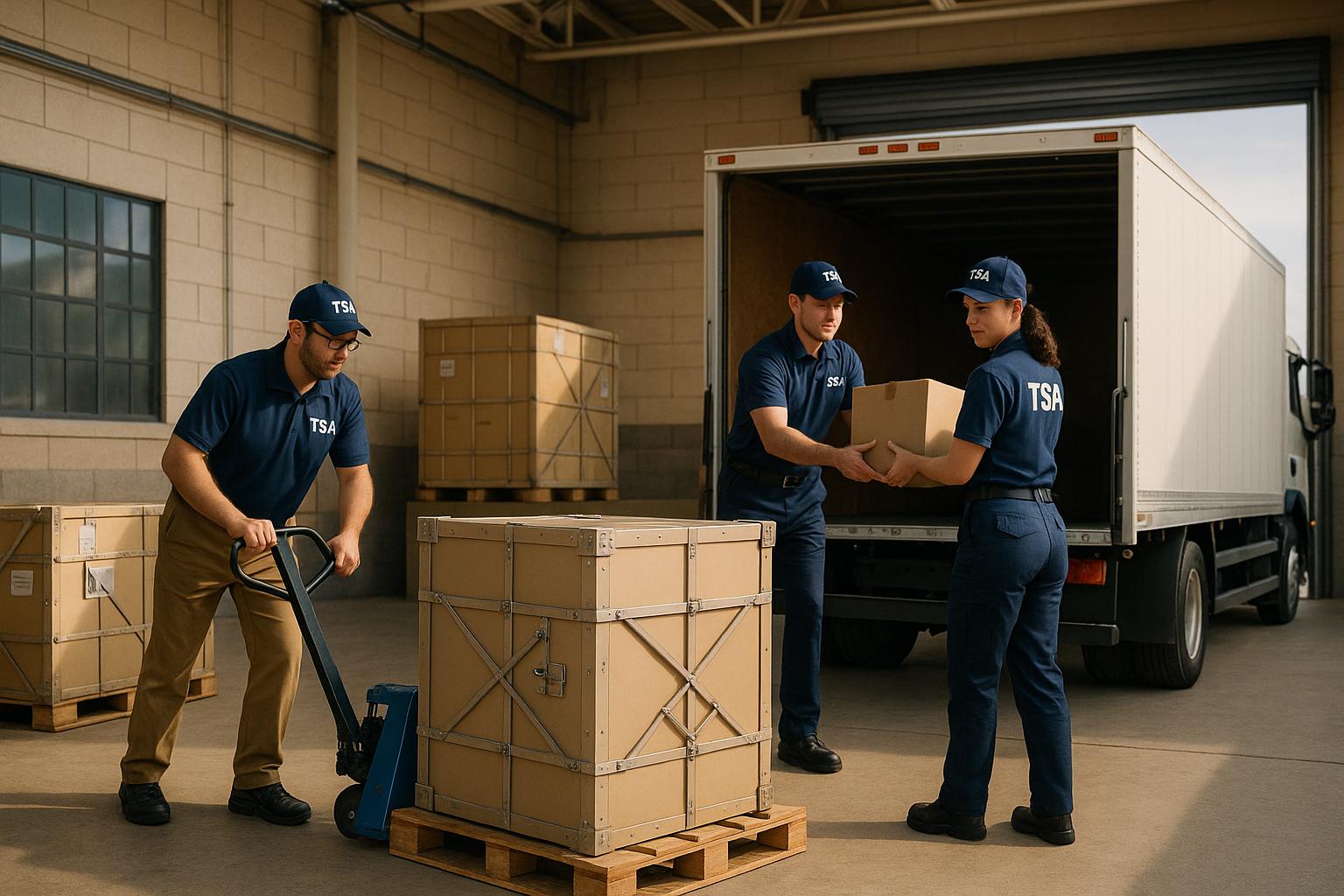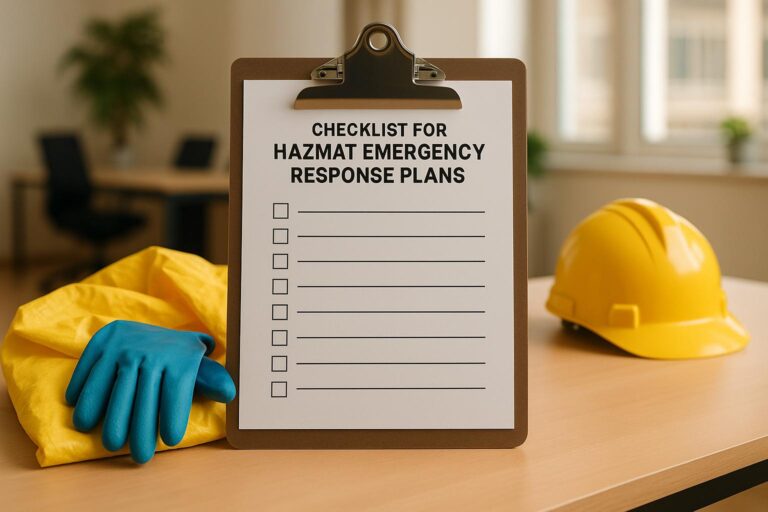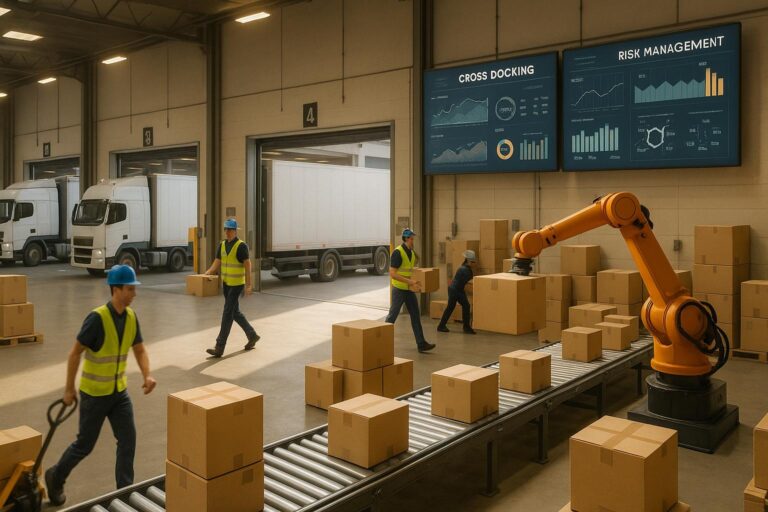TSA certification ensures the safety of high-value cargo by enforcing strict security measures across every stage of the shipping process. It includes facility security, personnel screening, and operational protocols to minimize risks like theft and tampering. Businesses benefit from enhanced security, customer trust, and compliance with federal regulations, making it a critical step for secure air cargo transportation.
Key Points:
- Facility Security: Restricted access, surveillance, and alarms safeguard cargo.
- Personnel Screening: Background checks and regular training ensure reliable handling.
- Operational Procedures: Chain-of-custody protocols and real-time tracking maintain shipment integrity.
- Compliance: Adherence to federal guidelines like Title 49 CFR strengthens security.
TSA certification is essential for businesses handling high-value shipments, offering peace of mind and protection throughout the supply chain.
TSA On the Job: Cargo Transportation Security Inspector
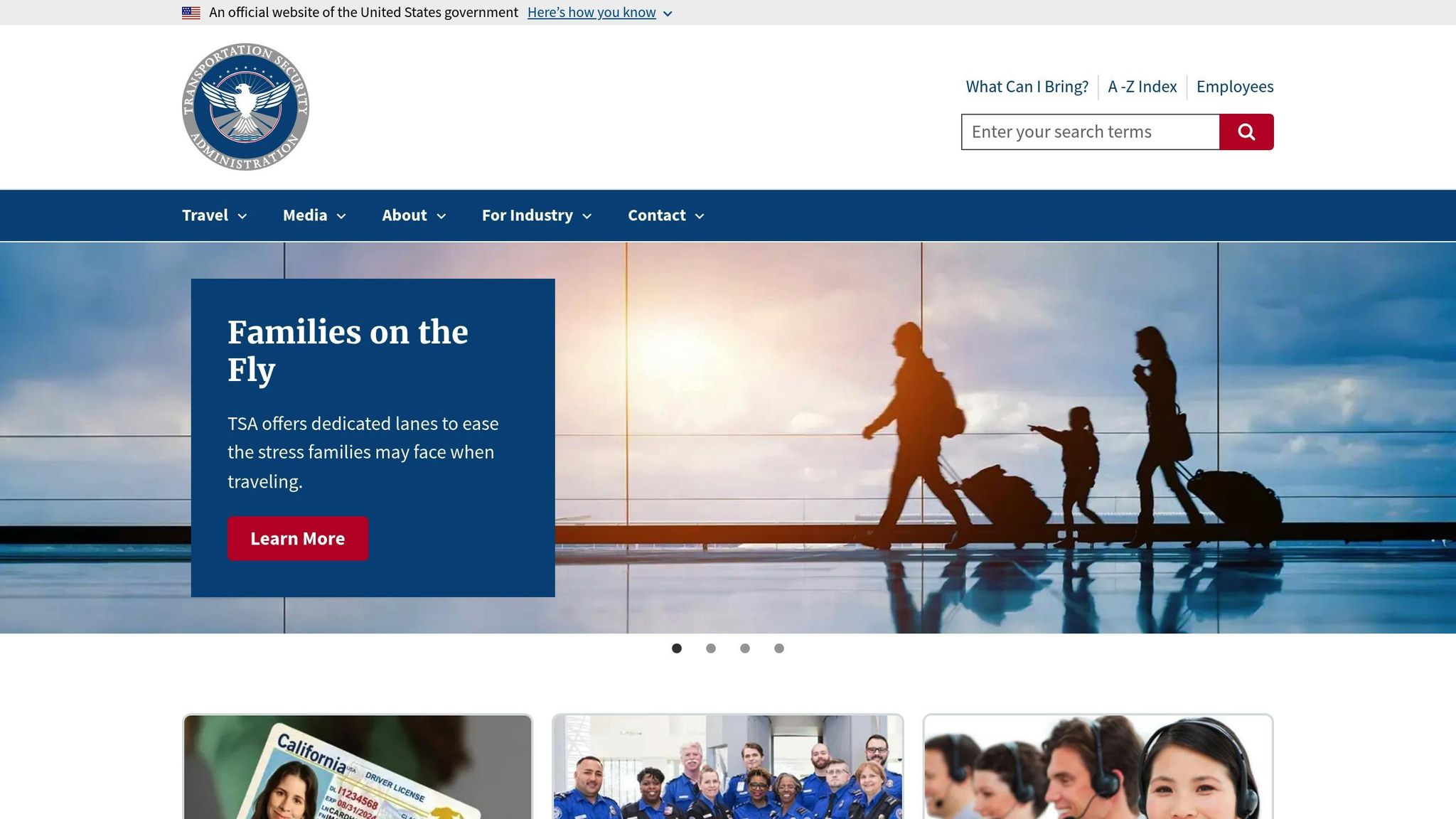
How TSA Certification Protects High-Value Cargo
TSA certification enforces strict security protocols to protect high-value cargo throughout its journey. These measures are designed to shield sensitive shipments from unauthorized access and potential threats, ensuring their safe delivery.
One vital aspect is personnel screening, which involves thorough background checks and ongoing security training. This ensures that only trusted, well-trained individuals handle valuable shipments at every stage. These checks and training programs are seamlessly integrated into the cargo-handling process to uphold security standards.
Physical security is another cornerstone. Certified facilities must have secure storage areas equipped with controlled access, surveillance systems, and alarm setups. During transportation, similar precautions are taken – vehicles are often outfitted with secure locking mechanisms and tracking technologies to maintain the cargo’s integrity.
Advanced monitoring technologies play a crucial role by tracking cargo movements in real time. This helps quickly detect any deviations and mitigate risks. Below, we break down the key elements of TSA certification for high-value cargo.
What TSA Certification Includes for High-Value Cargo
TSA certification focuses on three primary areas to secure high-value shipments:
- Facility Security: Certified facilities must have restricted-access storage areas, continuous surveillance, and reliable alarm systems to prevent unauthorized entry.
- Personnel Screening: Employees undergo rigorous background checks and regular security training to ensure they can identify threats and handle sensitive shipments responsibly.
- Operational Procedures: Clear chain-of-custody protocols are in place to verify and maintain cargo integrity throughout the shipping process.
Federal Compliance Requirements You Must Follow
Adherence to federal regulations further strengthens these security measures. TSA-certified operations are required to follow the guidelines outlined in Title 49 of the Code of Federal Regulations. This includes maintaining detailed security documentation covering every aspect of cargo handling – from acceptance and screening to storage, transportation, and emergency response.
Unannounced audits are conducted regularly to ensure these protocols are effective and consistently followed. Should a security incident occur, operators must report it immediately and implement corrective actions to prevent future issues.
Ongoing compliance is also critical. Employees must complete periodic training and re-screening to remain certified. Additionally, any security technology in use must be maintained to meet TSA standards. These requirements collectively support a robust security framework, ensuring high-value cargo remains protected at every stage of its journey.
Benefits of TSA Certification for High-Value Cargo
TSA certification plays a key role in ensuring the safe and efficient handling of high-value cargo. It not only helps reduce risks but also strengthens a company’s reputation. By meeting strict security requirements, businesses demonstrate their dedication to safety, which builds customer trust and lowers the likelihood of liability issues.
Enhanced Security Measures
TSA-certified operations are required to follow rigorous security protocols, including regular physical inspections. These measures ensure that high-value cargo is protected at every stage of its journey. Such a robust framework not only safeguards the cargo but also reassures clients, reducing concerns about potential vulnerabilities.
Increased Customer Trust and Reduced Liability Risks
When a company adheres to TSA standards, it sends a clear message to customers: their valuable shipments are in safe hands. This certification confirms compliance with stringent security requirements, which naturally builds trust. Additionally, by addressing potential risks – especially in international shipping – TSA certification helps reduce liability, offering businesses an added layer of protection.
How to Get TSA Certification for High-Value Cargo Handling
Securing high-value cargo begins with a thorough certification process that lays the groundwork for every other security measure. Earning TSA certification involves meeting federal standards, implementing strict security protocols, and ensuring ongoing compliance. While the process may take time, the benefits are clear: stronger operations and heightened customer trust. These steps reduce risks and build confidence in your cargo handling capabilities.
TSA Certification Application Process
The first step is determining the type of TSA certification your facility needs. Certified Cargo Screening Facilities (CCSFs) focus on physically screening cargo, while Indirect Air Carriers (IACs) manage transportation and logistics. Each certification comes with specific facility requirements and documentation guidelines.
Before applying, your facility must meet TSA’s physical security standards. This includes having a detailed Facility Security Plan (FSP) that outlines everything from perimeter controls to internal monitoring systems. These plans serve as the backbone of your security infrastructure.
Additionally, all personnel handling high-value cargo must undergo background checks. Along with the FSP, you’ll need to submit your standard operating procedures and employee training protocols during the application process.
As part of the review, TSA inspectors will conduct on-site evaluations. They’ll assess your screening equipment, review security measures, and interview key staff to verify compliance with TSA standards. This comprehensive process ensures your facility is prepared to handle high-value cargo securely and efficiently.
Employee Training and Security Standards
TSA certification also hinges on employee training. Everyone involved in handling high-value cargo must complete specialized training programs that cover screening techniques, threat identification, and proper cargo handling procedures. Keeping this training aligned with current TSA regulations is essential.
Your security measures should cover the entire chain of custody, from the moment cargo enters your facility to its placement on an aircraft. This includes implementing tracking systems and limiting access to authorized personnel only.
Training doesn’t stop after initial certification. Regular updates are necessary to address new security threats and procedural changes. Employees must know how to spot suspicious packages, respond to incidents, and maintain screening accuracy under various conditions. Training should also cover the operation and upkeep of security equipment, ensuring staff can effectively use screening machines, interpret scans, and perform routine maintenance.
Well-trained employees play a critical role in maintaining compliance and readiness for audits, which is the next essential step.
Regular Audits and Compliance Monitoring
Maintaining TSA certification requires ongoing compliance through regular audits. Starting in 2025, TSA regulations will introduce more frequent audits for air cargo screening protocols, along with stricter penalties for non-compliance. Indirect Air Carriers (IACs) must undergo regular compliance audits and renew their TSA-approved security programs annually. Certified Cargo Screening Facilities (CCSFs) face on-site validations and TSI-C inspections. TSA inspectors may conduct these evaluations with little or no notice, so your facility must always meet certification standards.
To stay prepared, create a TSA Compliance Checklist that covers all daily security operations. This checklist should be integrated into your regular workflows and updated whenever TSA regulations change. Using digital tools for checklists can provide real-time updates, automated reminders, and secure record-keeping to streamline compliance efforts.
Internal audits can help you identify and address potential issues before TSA inspections occur. Schedule periodic reviews of your compliance procedures and gather input from employees to improve processes. Keep detailed records of security activities, equipment maintenance, and training programs to demonstrate compliance during inspections.
The secret to successful audit preparation lies in fostering a mindset of continuous improvement. Stay updated on regulatory changes by monitoring TSA announcements and industry news. Quickly adapt your procedures to meet new requirements, ensuring your facility remains compliant and ready for inspections at all times.
sbb-itb-c0b8770
How to Maintain TSA Certification and Improve Security
Keeping TSA certification requires a committed, ongoing approach to security management. With TSA now imposing more frequent audits and stricter penalties for non-compliance, logistics providers must adopt reliable and forward-thinking security measures. Below, we’ll explore how regular audits, advanced technologies, and risk assessments contribute to maintaining compliance and strengthening security.
Schedule Regular Audits and Staff Training
To align with TSA’s rigorous inspection schedule, internal audits should be conducted on a monthly basis. These reviews need to cover all operational aspects – from ensuring equipment is properly calibrated to evaluating employee performance – to catch potential problems before they escalate into compliance violations.
For employees in security-sensitive roles, TSA-approved training is mandatory within the first year of certification, with refresher training required every three years. All training records, including dates, course details, and employee information, must be preserved for at least five years. Incorporating scenario-based drills into training programs can help employees sharpen their ability to recognize threats and respond effectively during emergencies.
Detailed documentation is also essential. Maintain thorough records of employee security training, including names, job roles, hiring dates, and training completion dates. This not only prepares your company for audits but also demonstrates a strong commitment to compliance.
Use Advanced Security Technology
Modern technology is a cornerstone of effective security for high-value cargo. Electronic tracking systems provide real-time visibility across the supply chain, ensuring an uninterrupted chain of custody from pickup to delivery while minimizing human error.
Access control systems, such as biometric scanners, key card systems, and multi-factor authentication, restrict facility access to authorized personnel only. These systems also generate activity logs, offering valuable insights during security reviews.
AI-powered surveillance adds another layer of protection by detecting unusual behavior or unauthorized access attempts. Upgrading screening equipment – like advanced X-ray machines with enhanced threat detection capabilities and explosive detection systems – further strengthens security. Regular calibration and maintenance of these tools ensure they remain effective against evolving threats.
Conduct Regular Risk Assessments
Risk assessments are a critical complement to audits and training. Conduct quarterly evaluations to identify new threats, refine security practices, and update incident response plans. Feedback from these assessments, as well as from drills and audits, should be used to continually improve training programs, protocols, and technology.
A systematic approach to identifying vulnerabilities – whether in physical security, employee training, or procedural consistency – can reveal areas that need attention. Turning these insights into actionable improvements ensures your security framework remains strong.
By creating feedback loops that capture lessons learned from incidents and routine operations, companies can refine their strategies, update training, and make smarter investments in security technology.
This layered approach to air cargo security – combining physical safeguards, advanced technology, personnel training, and procedural controls – not only supports TSA compliance but also ensures the safe transit of high-value cargo. Proactively investing in these measures allows companies to meet increasing regulatory demands while maintaining operational efficiency.
CR Express: TSA-Certified Solutions for High-Value Cargo
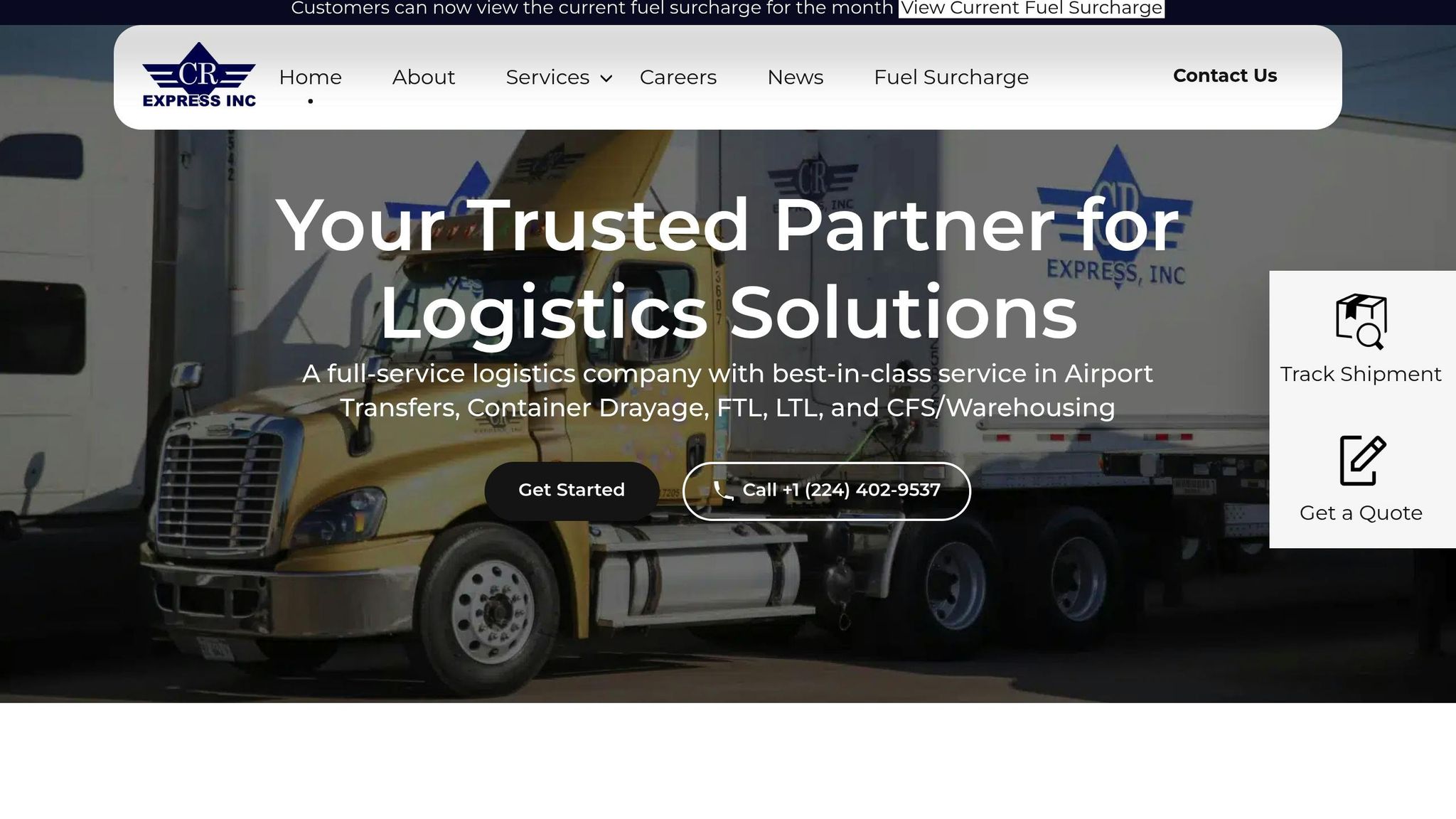
CR Express takes the complexity out of certification and compliance by offering businesses a seamless way to meet TSA standards for high-value cargo. With a focus on rigorous audits and advanced security protocols, they ensure sensitive shipments are handled with the utmost care and in full alignment with federal regulations. By partnering with a TSA-certified provider like CR Express, companies can simplify their operations while maintaining the highest security standards. Below, we’ll explore the services they provide and the advantages they offer.
Comprehensive TSA-Approved Services
CR Express delivers a full range of TSA-approved solutions tailored for high-value cargo. Their airport-to-airport TSA transfers rely on a TSA-bonded driver fleet to ensure a secure chain of custody for sensitive goods from start to finish.
Additionally, their customs bonded facility near Chicago O’Hare International Airport (ORD) offers certified container freight station (CFS) services. This strategic location near a major international hub minimizes transit times and reduces potential security risks during transfers.
For varied transportation needs, CR Express provides both full truckload (FTL) and less-than-truckload (LTL) shipping. Their air cargo services include dock and planeside delivery, supported by SIDA-badged drivers with tarmac access, ensuring strict adherence to airport security requirements.
Specialized Handling for High-Value and Sensitive Goods
CR Express goes beyond standard security measures, offering services designed for shipments requiring extra care. For instance, their pharmaceutical temperature-sensitive transfers are managed by TSA/bonded drivers equipped to maintain specific temperature ranges throughout transit. This service is especially critical for pharmaceutical companies transporting high-value medications that demand both secure and temperature-controlled conditions.
Their 280,000-square-foot warehouse is equipped with secured loading docks, full-coverage CCTV, motion-activated lighting, and over 10 acres of secured yard space. These features make it ideal for handling oversized or specialized cargo requiring enhanced security.
For government and defense contractors, CR Express provides solutions for sensitive materials that demand strict chain-of-custody documentation and security clearances. Their bonded warehousing ensures compliance with federal regulations while addressing the complex logistics needs of these industries.
Why Choose CR Express?
Partnering with CR Express offers a range of practical benefits for businesses managing high-value cargo. Their TSA-bonded operations eliminate the need for companies to secure their own certifications, saving both time and money.
With real-time tracking systems, CR Express provides full visibility into your cargo’s journey, ensuring transparency and helping businesses meet insurance and customer expectations for sensitive shipments.
Their strategic location near key transportation hubs, combined with services like cross-docking, container drayage, and specialized storage, helps reduce transit times and handling risks. This integrated approach streamlines logistics while maintaining strict security compliance.
CR Express also excels in managing shipments with complex requirements, such as hazardous materials certification and temperature-controlled storage. This expertise is especially valuable for industries like pharmaceuticals, electronics, and aerospace, where shipments often demand both high security and specialized handling.
Conclusion: Improve High-Value Cargo Handling with TSA Certification
TSA certification goes beyond meeting regulatory requirements – it’s a smart move for securing shipments, improving operations, and driving business growth. By implementing a robust, multi-layered security system, TSA certification helps prevent unauthorized access and reduces the risk of theft.
Faster cargo screening minimizes delays, ensuring shipments move quickly and meet tight deadlines. This efficiency also opens the door to flexible flight schedules, making transit smoother and more reliable – key advantages that can lead to financial benefits.
"TSA certification is more than just a set of rules – it’s a commitment to security and efficiency in freight forwarding. By working with TSA-certified carriers, freight forwarders can protect their shipments, streamline operations, and build trust with their clients and partners. It’s an investment in safety and reliability that pays dividends in the long run." – Everglory Logistics
Beyond operational gains, TSA certification builds customer trust, strengthens reputations, and creates new business opportunities. With detailed tracking and real-time reporting, companies can boost supply chain transparency, make smarter decisions, and manage risks more effectively – all of which positively impact revenue.
For businesses managing high-value cargo, partnering with TSA-certified providers like CR Express simplifies the process. Providers like CR Express handle the complexities of certification, offering TSA-approved transportation and secure facilities that align with your needs.
Choosing TSA-certified practices – whether through direct certification or by working with certified partners – gives businesses a competitive edge. Enhanced security, faster processing, and improved client relationships are just a few of the benefits. In today’s security-focused market, adopting TSA-approved solutions is a critical step for businesses handling high-value shipments.
FAQs
What are the steps to get TSA certified for handling high-value cargo?
The TSA certification process for managing high-value cargo is designed to ensure that individuals meet stringent security requirements. Here’s what it entails:
- Application Submission: Applicants must submit their paperwork to the TSA for thorough review.
- Written Exam: A test is required to confirm a solid understanding of security protocols.
- Background Check and Fingerprinting: These steps are conducted to confirm the applicant’s eligibility.
- Specialized Training: Participants undergo focused training on cargo security procedures.
This detailed process ensures that anyone handling high-value cargo is thoroughly screened and equipped with the necessary knowledge to uphold strict security measures.
How does TSA certification improve the security and handling of high-value cargo?
TSA certification is a key factor in safeguarding high-value cargo, thanks to its strict security measures. These measures include detailed screening processes, physical inspections, and careful document checks, all aimed at preventing unauthorized access and minimizing the chances of theft.
On top of that, TSA certification ensures adherence to federal rules, like the mandate for 100% screening of air cargo on passenger flights. This approach not only boosts security but also simplifies shipping operations, allowing businesses to transport valuable goods more smoothly and with fewer interruptions.
What happens if a business doesn’t comply with TSA certification requirements?
Failing to meet TSA certification requirements can lead to serious consequences for businesses. These include civil penalties of up to $50,000 per violation, the suspension or loss of security privileges, and delays in cargo processing. Such setbacks can disrupt your operations, tarnish your reputation, and result in financial losses.
Staying compliant helps ensure the smooth handling of high-value cargo, reduces risks, and protects your business from avoidable challenges.
